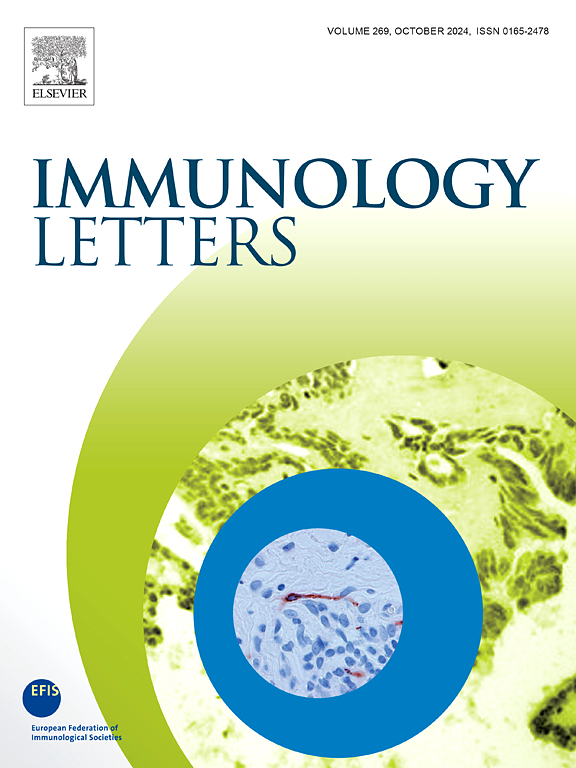Importance of BCG Vaccination at birth in Pediatric Patients with Chronic Granulomatous Disease after Hematopoietic Stem Cell Transplantation in Developing Countries
IF 2.8
4区 医学
Q3 IMMUNOLOGY
引用次数: 0
Abstract
Introduction
Recent advances in hematopoietic stem cell transplantation (HSCT) have improved clinical outcomes; however, various factors continue to influence HSCT success, especially vaccination in immunocompromised patients who receive vaccination at birth. While several studies have investigated the efficacy of vaccines in Chronic Granulomatous Disease (CGD) patients, the specific impact of vaccination on HSCT outcomes in these patients has not yet been studied. This study aimed to address an important gap in the current literature by investigating the effects of BCG vaccination on HSCT outcomes in patients with CGD.
Participants and Methods
In this prospective study, 24 pediatric patients with CGD were enrolled from 2016 to 2022, all of whom received the same reduced-intensity conditioning (RIC) regimen before HSCT. Of these, 12 patients received the Bacillus Calmette-Guérin (BCG) vaccine, while 14 patients were not vaccinated.
Results
Contrary to other studies, our results showed that CGD patients who received the BCG vaccine before HSCT experienced varying degrees of BCGosis and BCGitis. Specifically, 8 patients showed symptoms of BCGosis, while 4 patients showed symptoms of BCGitis. In addition, our findings revealed no significant differences in graft-versus-host disease (GvHD) and other complications of HSCT between BCG-vaccinated and non-BCG-vaccinated CGD patients, although the overall survival (OS) rate was lower in the vaccinated group. This may be attributed to the reduced-intensity conditioning regimen applied to all patients which can balance HSCT outcome in CGD patients.
Discussion and conclusion
Our study emphasizes the importance of screening and diagnosing immunodeficient patients at birth, especially in developing countries where BCG vaccine is administered at birth, as post- vaccination complications can significantly affect HSCT outcomes and subsequent treatments. BCG vaccination can significantly affect HSCT outcomes and subsequent treatments.
发展中国家造血干细胞移植后慢性肉芽肿病患儿出生时接种卡介苗的重要性
导读:造血干细胞移植(HSCT)的最新进展改善了临床结果;然而,各种因素继续影响移植的成功,特别是免疫功能低下的患者在出生时接种疫苗。虽然有几项研究调查了疫苗对慢性肉芽肿病(CGD)患者的疗效,但尚未研究疫苗接种对这些患者造血干细胞移植结果的具体影响。本研究旨在通过调查卡介苗接种对CGD患者造血干细胞移植结果的影响,解决当前文献中的一个重要空白。参与者和方法:在这项前瞻性研究中,从2016年到2022年,24名儿童CGD患者入组,所有患者在HSCT前接受相同的降低强度调节(RIC)方案。其中,12名患者接种了卡介苗,14名患者未接种疫苗。结果:与其他研究相反,我们的研究结果显示,在移植前接种卡介苗的CGD患者出现不同程度的BCGosis和BCGitis。其中8例出现bcgsis症状,4例出现bcgtis症状。此外,我们的研究结果显示,接种bcg和未接种bcg的CGD患者在移植物抗宿主病(GvHD)和其他HSCT并发症方面没有显著差异,尽管接种组的总生存率(OS)较低。这可能归因于所有患者采用的低强度调节方案,可以平衡CGD患者的HSCT结果。讨论和结论:我们的研究强调了出生时筛查和诊断免疫缺陷患者的重要性,特别是在出生时接种卡介苗的发展中国家,因为接种后的并发症会显著影响移植结果和随后的治疗。卡介苗接种可显著影响移植结果和后续治疗。
本文章由计算机程序翻译,如有差异,请以英文原文为准。
求助全文
约1分钟内获得全文
求助全文
来源期刊

Immunology letters
医学-免疫学
CiteScore
7.60
自引率
0.00%
发文量
86
审稿时长
44 days
期刊介绍:
Immunology Letters provides a vehicle for the speedy publication of experimental papers, (mini)Reviews and Letters to the Editor addressing all aspects of molecular and cellular immunology. The essential criteria for publication will be clarity, experimental soundness and novelty. Results contradictory to current accepted thinking or ideas divergent from actual dogmas will be considered for publication provided that they are based on solid experimental findings.
Preference will be given to papers of immediate importance to other investigators, either by their experimental data, new ideas or new methodology. Scientific correspondence to the Editor-in-Chief related to the published papers may also be accepted provided that they are short and scientifically relevant to the papers mentioned, in order to provide a continuing forum for discussion.
 求助内容:
求助内容: 应助结果提醒方式:
应助结果提醒方式:


